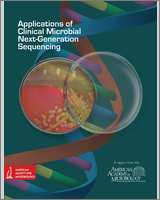Case Study 7Encephalitis caused by a neuroinvasive astrovirus infection detected using unbiased NGS (96)
Approximately 1 month following an allogeneic bone marrow transplant, a 42-year-old man developed lymphopenia, diarrhea, and aggressive sensorineural deafness resulting in bilateral hearing loss. The results of a brain magnetic resonance image (MRI) and enterovirusand herpesvirus-specific PCR were negative. Microbiological testing on frontal lobe biopsy tissue was unrevealing. Because a viral etiological agent was suspected, the patient was treated with high-dose glucocorticoids and intravenous immunoglobulin. Due to the difficulty diagnosing the patient along with his progressive neurological deterioration, unbiased NGS was used on a CSF sample and brain biopsy tissue. Sequencing results displayed a neuroinvasive infection with an astrovirus belonging to the recently discovered VA/ HMO clade that is distinct from human astrovirus clades 1 to 8 which are targeted by conventional reverse transcription-PCR assays. Despite the NGS diagnosis, treatment did not stop the progression of infection and the patient died. However, there is no approved therapy for astrovirus encephalitis. This report demonstrates that NGS has the capability of detecting all potential pathogens simultaneously.
